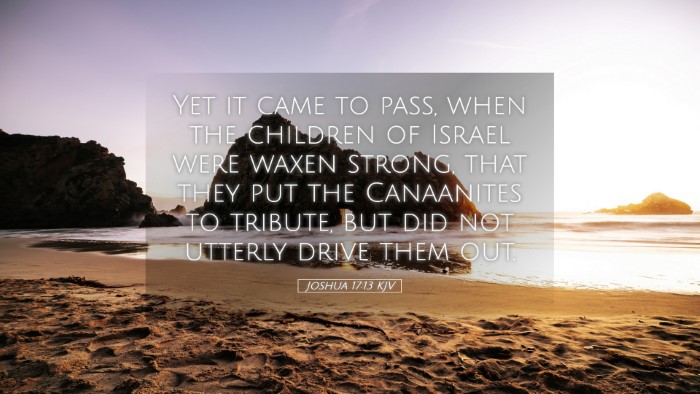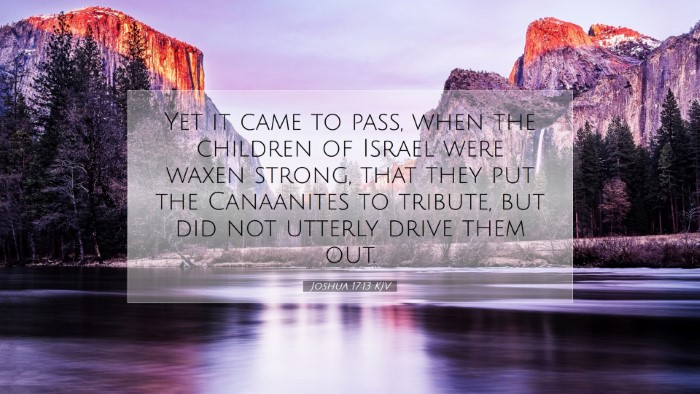Old Testament
Genesis Exodus Leviticus Numbers Deuteronomy Joshua Judges Ruth 1 Samuel 2 Samuel 1 Kings 2 Kings 1 Chronicles 2 Chronicles Ezra Nehemiah Esther Job Psalms Proverbs Ecclesiastes Song of Solomon Isaiah Jeremiah Lamentations Ezekiel Daniel Hosea Joel Amos Obadiah Jonah Micah Nahum Habakkuk Zephaniah Haggai Zechariah MalachiJoshua 17:13
Joshua 17:13 KJV
Yet it came to pass, when the children of Israel were waxen strong, that they put the Canaanites to tribute, but did not utterly drive them out.
Joshua 17:13 Bible Commentary
Commentary on Joshua 17:13
Joshua 17:13 states:
"Yet it came to pass, when the children of Israel were waxen strong, that they put the Canaanites to tribute, but did not utterly drive them out."
Introduction
This verse encapsulates a crucial moment in Israel's history as they navigate the complexities of conquest, settlement, and obedience to God's commands. The insights from various public domain commentaries reveal the multifaceted implications of Israel's actions, as well as their theological ramifications.
Commentary Insights
Historical Context
Matthew Henry suggests that the context of this verse reflects a transitional phase for the Israelites. Having entered the Promised Land, they were faced with the task of settling and establishing their lives while dealing with the remaining Canaanite populations.
Albert Barnes provides additional insights into the social dynamics at play. The Israelites, as they became stronger in numbers and influence, sought a way to coexist with the Canaanites rather than completely oust them, leading to a complex relationship that involved tribute.
Theological Implications
Adam Clarke examines the theological consequences of Israel's actions. By not fully driving out the Canaanites, the children of Israel disobeyed God's explicit commands concerning conquest, which were intended to ensure the sanctity of the land. The failure to adhere to these commands raises questions about faithfulness and the long-term impact of compromise.
Henry highlights how Israel's strength may have led to complacency. Instead of total obedience, they chose a path of partial compliance, which would have dire consequences revealed in subsequent biblical narratives.
Practical Applications
Barnes encourages modern readers to reflect on their own lives concerning spiritual compromises. Just as the Israelites allowed remnants of Canaanite influence to remain, believers today may falter in completely surrendering areas of their lives that God calls them to cleanse.
Clarke emphasizes the importance of diligence in one's spiritual walk. The application for pastors and scholars is clear: to challenge their congregations to pursue holiness without reservation, guarding against the temptation to coexist with sin.
Ethical Considerations
This verse also raises ethical questions concerning the nature of warfare and conquest as presented in the biblical narrative. Henry points out that the Israelites’ decision to put the Canaanites to tribute instead of driving them out indicates a shift from obedience to opportunistic pragmatism.
These choices made by Israel can be seen as foreshadowing future conflicts and moral dilemmas. The implications of their decisions reverberate throughout Israel’s history and can offer lessons on the consequences of turning from God's direct commands.
Conclusion
In summary, Joshua 17:13 serves as a pivotal point for understanding Israel's journey into the Promised Land and the consequences of their actions. Through insights from Matthew Henry, Albert Barnes, and Adam Clarke, we gain a multidimensional view of the text that underscores the importance of total obedience to divine command, the dangers of compromising faith, and the broader ethical implications of their actions.
For pastors, theologians, and students, this verse is not just historical; it serves as a cautionary tale about the nature of faithfulness to God and the consequences of our choices in spiritual matters.


